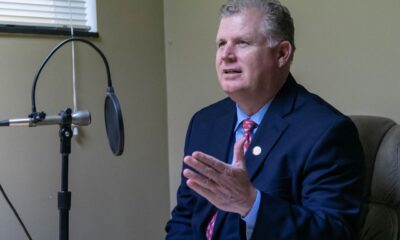National
Wisconsin budget panel approves road-funding plan

Senate, Assembly chairs disappointed no long-term solution was reached
MADISON, Wis. — The Legislature’s budget-writing committee Tuesday night approved a road-funding plan that would borrow about $400 million, raise fees on electric and hybrid vehicles, further study toll roads for interstates in Wisconsin but not increase the gas tax.
The Joint Finance Committee deal, reached between Senate and Assembly Republicans but without Democratic support, came as the panel moves to complete its work on the $76 million budget that’s two months late.
Committee co-chairs Rep. John Nygren and Sen. Alberta Darling both expressed disappointment that they failed to reach a longer-term solution for transportation funding, a perennial problem caused by deteriorating roads and not enough incoming fuel tax to pay for planned projects. Republican Gov. Scott Walker refused to sign-off on a gas tax increase to solve the problem, and instead called for delaying road work and borrowing more.
“This is one that’s left unsolved,” Nygren said, while defending the plan for making progress.
Democrats said Republicans failed.
“This is a bipartisan problem but this is a very partisan solution that doesn’t do anything,” said Democratic Sen. Jon Erpenbach of Middleton. “It doesn’t fix anything, it makes things worse.”
The roads funding plan was one of the final pieces of the budget the committee was voting on as it planned to complete its work on Wednesday. The last issues for the committee to take up were taxes and a typically wide-ranging wrap-up motion. Once completed, the budget heads to the Assembly while could vote on it as soon as next week.
The transportation deal would borrow roughly $402 million for roads, including $250 million included in a separate bill to complete rebuilding of Interstate 94 from Milwaukee south to the Illinois border. That is about $100 million less in borrowing than Walker called for.
There would be no new money for two massive interstate projects in the Milwaukee area, on I-94 between the Marquette and Zoo interchanges and north of the Zoo. There could be other delays on road projects, but there were no immediate details.
There would be $144 million to expand I-94 to six lanes along 7.5 miles in St. Croix County in western Wisconsin on a trucking route into the Twin Cities.
Darling said she was “very disappointed” with the delay in finishing that work around Milwaukee, calling it short-sighted.
“We’re going to have orange buckets up all over the place for years,” she said.
Madison-area business leaders earlier Tuesday called on lawmakers and Walker to reach a long-term funding solution for roads, saying delays on the Verona Road/Highway 151 project south of Madison were hurting their bottom lines.
“Do it. Figure it out. Show some real leadership,” said Democratic state Rep. Terese Berceau.
The budget plan would include a new $100 fee on electric vehicles and $75 for hybrid vehicles. That’s on top of the usual $75 fee for vehicles now. The argument is the electric and hybrid vehicle owners pay less of their share in gas taxes but still use the same roads that depend on money from the gas tax to be maintained. It would generate about $8.4 million over the next two years.
The state would spend $2.5 million studying the possibility of interstate tolling, with a report due to the Legislature in 2019. Tolling would require federal approval. Republicans were also calling for limiting local government oversight of quarries primarily used for public works or private construction projects. It would not apply to frack sand mines.
The GOP proposal would also repeal a minimum salary requirement, known as the prevailing wage, for state building or highway projects. The Legislature eliminated the prevailing wage for local projects in 2015. The committee also voted to cut 200 positions at the state Department of Transportation.
How to plug a roughly $1 billion shortfall in road funding was the largest unsolved issue in the state budget, but numerous other issues — including whether to go along with Walker on cutting personal income taxes and imposing a sales tax holiday for back-to-school purchases — remained.
The full Legislature must pass the budget, and Walker has to sign it, before it takes effect. The budget was due July 1, but current spending has continued during the impasse.







